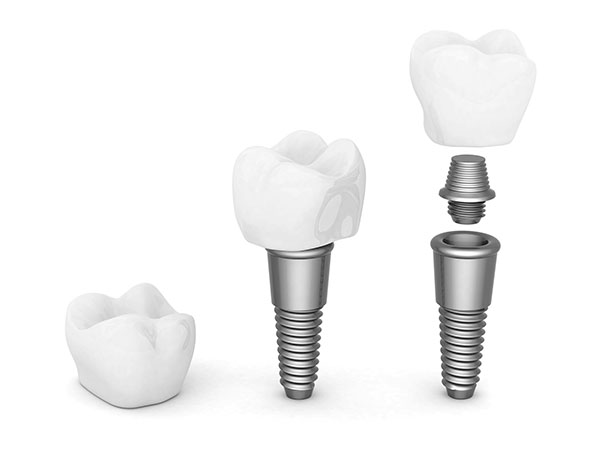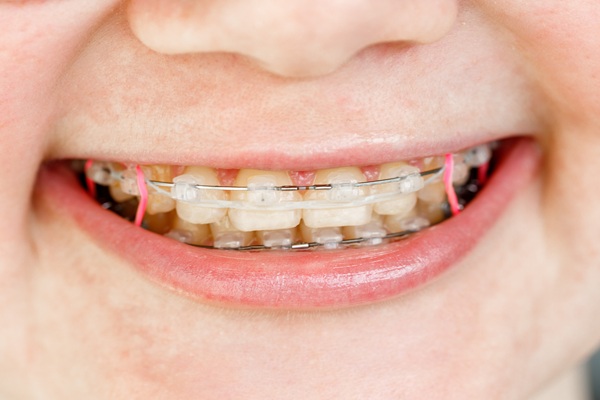The Many Reasons Dental Implants Are So Effective
 After centuries of development dental implants are among one of the most advanced, and yet one of the most simplistic, surgical prosthetic devices that you can have installed. Today's implants are designed and built so that they can act as an anchor for a new fake tooth that looks, feels, and behaves like a natural tooth. Our primary focus has been in integrating these dental implants with your jawbone in such a way that the body believes the implant to be natural and accepts it. Done properly, as we do them, the tissue around the implant will interact with the implant and even grow around it so that it is strong, secure, and cohesive. To aid in this endeavor, we have a number of different surfaces that are used on the implants including acid-etched implants, grit-blasted implants, plasma-sprayed implants, and hydroxyapatite-coated implants.
After centuries of development dental implants are among one of the most advanced, and yet one of the most simplistic, surgical prosthetic devices that you can have installed. Today's implants are designed and built so that they can act as an anchor for a new fake tooth that looks, feels, and behaves like a natural tooth. Our primary focus has been in integrating these dental implants with your jawbone in such a way that the body believes the implant to be natural and accepts it. Done properly, as we do them, the tissue around the implant will interact with the implant and even grow around it so that it is strong, secure, and cohesive. To aid in this endeavor, we have a number of different surfaces that are used on the implants including acid-etched implants, grit-blasted implants, plasma-sprayed implants, and hydroxyapatite-coated implants.
Dental implants that are coated with hydroxyapatite integrate with the bone far more easily. This is because hydroxyapatite is a naturally occurring substance that is found in human bones. Essentially the body is tricked into believing that that dental implant is an integral part of the bone and treats it as such. When combined with the natural tendency of titanium to meld with human tissue in such a way that the bone grows around it, the implant becomes very durable. This is one of the major reasons why we have made such great progress in integrating dental implants with the jawbone. Titanium has a number of qualities other than osseointegration that has made it a perfect metal from which to fabricate dental implants. Titanium is strong but light, and also is resistant to corrosion, which is critical to having a successful device. There are a number of different kinds of implants, designed for different needs and mostly dependent on the amount of bone mass you have available.
The most commonly used dental implant is called a root-form implant or endosseous implant. These types of implants are placed directly into the bone, under the gum surface where we expect to place the crown or other false tooth. These implants are formed in the shape of a cone. Typically they are a screw or a nail so that it is easier to place them into the bone. The jawbone then provides a level of security and stability for the implant. A root-form implant requires a decent among of bone density.
At times, and with some patients, we simply do not have a bone that is dense enough or strong enough to withstand a root-form implant surgery. In cases like this we would use a different type of implant, known as a Ramus frame implant. A Ramus frame implant is attached at a distance from the tooth, around the wisdom teeth and chin. A thin metal bar is left, exposed between the two screws, to which we can attach a bridge or dentures. This dental implant has a lot more stability than dentures and serves to strengthen the jaw, especially in cases where there is a risk of the jaw fracturing.
Cosmetic Dentist > Emergency DentistRecent Posts
Dental implants are highly recommended when it comes to replacing missing teeth. They are the only oral prosthetics that replace teeth and their roots. Other prosthetics like dentures and bridges simply replace the visible part of the tooth.Implants are surgically placed in the patient’s jaw and left there to fuse with surrounding bone tissues. The…
Many dental professionals recommend dental implants restoration after tooth loss. Dental implants offer superior durability and functionality and look just the same as natural teeth. However, some patients are nervous about the success rate of dental implant restoration, and learning more about what the stats say can help you physically and mentally prepare yourself. According to…
There are plenty of options available when it comes to tooth replacement, but one that stands out above the rest is dental implants. These have become the best long-term solution to tooth replacement, and the technology has advanced to an almost unrecognizable degree from what it was even just ten years ago. If you're considering…
Dental implants are easy to care for at home and with regular visits with your general dentist. You can ensure your dental implants last for as long as possible by understanding useful tips for caring for your new teeth and periodontal health at home through good oral care and smart dietary and lifestyle choices. Dental implants…
 After centuries of development
After centuries of development 
